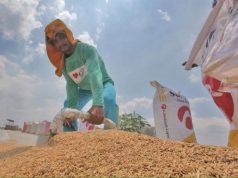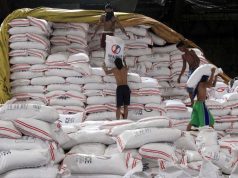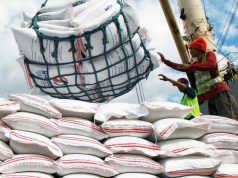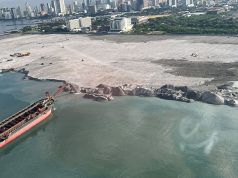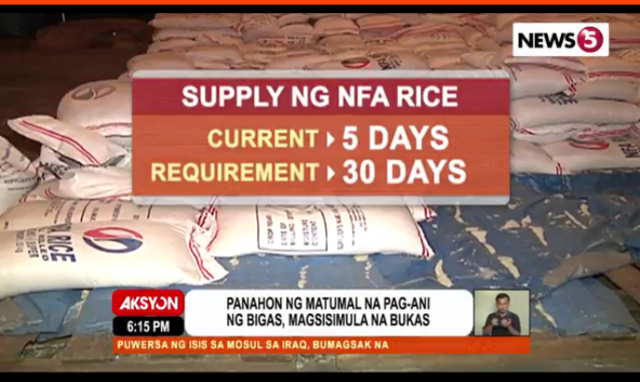
MANILA – National Food Authority (NFA) Administrator Jason Aquino faced grilling from senators led by Cynthia Villar over his announcement – blamed for confusing and unduly alarming people – that the NFA buffer stock was fast dwindling even while data showed rice distribution very high.
Villar, chair of the Senate agriculture committee, led Tuesday a public hearing on the problems of the NFA and related issues such as flaws in its rice procurement program and the debates on whether or not the NFA should have imported rice and boosted its buying activities.
Villar was particularly miffed by Aquino’s reported remark in the media that the NFA buffer stock was down to just a few days, when it is mandated to keep at least a 15-day buffer.
The least he should have done was to quietly speed up the buying of rice from farmers and redress his agency’s deficiency instead of alarming the public with such a remark. The matter also caused confusion because some quarters thought the overall supply — not just NFA’s stock — of rice in the market was very low, thus jacking up prices further, Villar said.
“Hindi ko maintindihan ano ang reason mo sa presscon na wala na tayong NFA rice? Di ba dapat pag wala kang buffer stock, manahimik ka ang silently do your work. Nagpa-panic mga tao, akala nila wala nang rice sa Pilipinas [I don’t see the point in your saying at a press conference that we’ve run out of NFA rice. Shouldn’t you have just kept quiet and worked to fill the gap? People panicked; they thought there’s no more rice in the country],” Villar admonished Aquino at the start of the hearing.
“I just told the truth that NFA has a depleting supply,” Aquino replied.
To which Villar again reacted, “Then why would you announce that you didn’t do your job. Shouldn’t you be ashamed for not dooing enough? As it is, you caused much panic.”
For his part, Sen. Bam Aquino pointed out that NFA’s low buffer stock drove up the price of NFA rice from P27 pesos before to as much as P42 a kilo, a matter confirmed by the NFA Council.
“The week after that press release, nag-shoot up ang price ng bigas [the price of rice shot up],” according to Assistant Secretary Mercedita Sombilla, member of the NFAC.
“So again, that’s NFA’s fault. Because of that, families had to bear an additional P500 a month in their budget [to afford the rice]. That’s P500–that’s too much,” Senator Aquino stressed.
Officials of the Department of Agriculture assured senators there is no rice shortage now. In fact, rice production in 2017 even rose to
19.31 million metric tons, from the 17.63 million metric tons in 2016 when the country reeled from El Niño.
Agriculture Secretary Manny Piñol attributed to overall good weather the higher production in 2017. “Credit to the Almighty for providing us a favorable climate,” he said, adding, “our rice sufficiency is 96% and we want to increase that next year to 97%.”
Thus, senators repeatedly demanded to know from NFA chief Aquino why the agency’s buffer stock of rice plunged to as low as 2 days, when it is mandated to keep a 15-day buffer stock and as much as 30-day stock during lean months.
“Last year hindi kami makabili ng [we could not buy] pesos per kilo,” Aquino explained. The agency recommended that it be allowed to buy from farmers at 22 pesos, up from 17 pesos, “just so we can at least compete with the traders.” But, he added, “the NFA Council disapproved it.”
Villar then asked him, “if you buy [palay at] 22 pesos [a kilo], how much will you be selling rice?” When NFA’s Aquino replied, “45 pesos,” Villar pointed out that in that case, the agency would not be able to carry out its task “to sell low. Your mandate is to sell cheap to consumers. [But in this circumstance] you sell expensive to consumers.”
The NFAC, meanwhile, said it had told the NFA to start buying from farmers from October to December 2017, when they were still selling at P14-17 a kilo–particularly in Nueva Vizcaya, Aurora, Laguna, Quezon, Marinduque, Palawan, Camarines Sur and Norte.
NFA administrator Aquino disputed this information, though.
Sen. Kiko Pangilinan wanted to know why NFA didn’t step in to buy when prices were then at 14 pesos or 15 pesos. “Why wasn’t this done?”
NFA’s Aquino insisted “we were looking for such sources [of cheap rice] but couldn’t find them.”
The NFA chief found an ally in farmers. They explained that palay is really sold low when it’s just after harvest or it’s still wet. Once the palay dries and quality improves, it becomes hard to keep down the price at 17 pesos a kilo.
At such time, farmers tend to sell more to rice traders because then they can fetch a higher price.
Senators were of the consensus that, as an urgent option, the NFAC should an increase in the buying price of palay from P17 to P18 a kilo, adding that if this is done, the NFA supply in March, at harvest time, will be adequate.
However, once the buying price of palay rises to 18 pesos a kilo, the price of rice in the market will not slide down anew to P27 a kilo, but will also rise to P30-34 a kilo.
The NFAC promised to tackle the suggestion at their next meeting. By June, officials said, the supply of NFA rice will also be boosted because the rice imports will come in.
The heavily subsidized state-run grains agency will import 250,000 metric tons of rice mainly from Vietnam and Thailand to replenish its stock.
Senators pitched another solution: an executive order from President Duterte ordering that all smuggled rice in various ports like Cebu and Zamboanga be donated to NFA.
WHATEVER HAPPENED TO BANGAYAN? – POE
Also at Tuesday’s hearing, Sen. Grace Poe said it was important for the government to hale to court suspected big-time rice smuggler Davidson Bangayan, aka David Tan, and other members of syndicates or smugglers operating under the nose of the NFA.
“Matagal na nating naririnig ang pangalan ni Davidson Bangayan/David Tan. Nasa hearing natin yan noon. Mismong ang ating Presidente, sinabi na siya ay dadakpin. May kaso ba yan o hanggang ngayon wala pa rin? Hindi pa rin matunton?” Poe asked on Tuesday during the hearing of the Senate committee on agriculture on rice shortage.
During the Senate inquiry in 2014, it was established that Bangayan and Tan were one and the same person even as the businessman insisted that he was not the one named in intelligence reports as the prime mover in the rice smuggling industry. Then Davao City Mayor Rodrigo Duterte told the Senate that there was no doubt that Bangayan and Tan were the same person.
Customs officials told Senate probers they do not hold any record of Bangayan nor Tan. NFA officials, for their part, told senators that based on their records, there was no David Bangayan who participated in their biddings and that the NFA did not issue rice import permits to Bangayan.
Poe also cited a number of individuals who have continuously cropped up as having been involved in alleged illegal activities in the NFA. NFA Administrator Aquino admitted some of them were employed in the agency.
Poe moved to invite the Department of Justice and the National Bureau of Investigation in the next hearing to shed light on cases filed against the purported big-time rice smuggler.
The government had so far filed three cases against suspected rice smugglers and illegal importers in Cebu, Subic, Zamboanga under Republic Act No. 10845 or the Anti-Agricultural Smuggling Act of 2016, a result of the earlier Senate inquiry under the previous Congress.
It was also revealed that the Bureau of Customs still failed to fully account for the smuggled sacks of rice in Zamboanga after two months, which, according to Samahang Industriya ng Agrikultura chair Rosendo So were only 40,000 bags from the original 60,000 at the time the government flagged the shipment.
Meanwhile, Poe scored the NFA chief’s decision to recall NFA-designated personnel assigned to check rice imports at ports. “Hindi na natin mache-check ang quality ng rice na ini-import,” said Poe.
The senator also said a certain Marigold De Castro is in charge of rice-related businesses in Region 3 who acts as “front” for the NFA chief, while a certain Ritchie Carpio, De Castro’s cousin, allegedly acts as an “enforcer” of Aquino’s directives who has a direct hand in employees’ transfer if they defy Aquino’s orders.
Aquino denied this, saying he does not meddle in local procurement.
The NFA was put on a spotlight after it said its buffer stocks of cheap rice were running low. Aquino said it only has 1.7 days of existing stock, as against the mandated 15-day buffer stock at any given time and 30 days at the onset of the lean months of July to September.
The heavily subsidized state-run grains agency will import 250,000 metric tons of rice mainly from Vietnam and Thailand to replenish its stock.
KIKO: WHERE’S THE 245% INCREASE IN NFA RICE?
Senator Francis Pangilinan on Tuesday questioned inconsistent government data on rice supply, after the economic planning office reported an over-triple increase in distribution while the rice agency announced that rice supply will only last for two days.
Pangilinan, former head of the Office of the Presidential Assistant for Food Security and Agricultural Modernization (OPAFSAM), made his observations at the public hearing of the Senate Committee on Agriculture on the status of the country’s rice supply.
“At the same time na nagkaroon ng statement na two days na lang ang buffer stock, there is an increase in distribution? How can that be? Kung kulang na ang supply, pero mataas naman ang increase sa merkado ng bigas ng NFA, saan napunta yung 245% volume?” Pangilinan asked, referring to the National Food Authority.
Earlier this month, the NFA, which supplies low-priced rice to the public, released a statement saying that there were only two days’ worth of NFA rice left as they wait for clearance to import.
At the same hearing, the National Economic and Development Authority (NEDA) confirmed that there was, in fact, an increase in market penetration of NFA rice.
NEDA Assistant Secretary Mercedita Sombilla said: “There was a 245% increase in distribution or market penetration in January. And they are saying now that wala na po silang stock?”
Faced with a similar situation four years ago, Pangilinan recalled his experience with handling rising rice prices.
“When we were having a problem with the 2014 rice prices going up, we increased the presence of NFA rice in Metro Manila by as much as 79-80%. Para magstabilize yung rice prices. 79% lang. Yet now that we have a 245% increase, where did it go?” Pangilinan asked.
As OPAFSAM head from May 2014 to October 2015, Pangilinan also headed the NFA Council.
LAPSES IN RICE PROCUREMENT
Sen. Joel Villanueva expressed alarm over the lapses and irregularities of the NFA when it comes to its rice procurement process.
“What happened to the NFA’s procurement process especially the NFA people who directly buy and sell from the farmers in the agricultural regions?” Villanueva asked the NFA administrator.
In response, Aquino said that the NFA failed to buy rice supplies from the farmers because of its high price and delays in importation.
The Alliance of Grains Industry Stakeholders Philippines chairperson Teresa Alegado, validated Villanueva’s statement and said this is the first time in her 40 years of experience in dealing with rice distribution that a massive shortage and immense price increase of NFA rice has occurred.
“The NFA seriously needs to improve the implementation of its rice procurement policies such as the direct procurement of rice from farmers and cut out the middlemen, and hasten the importation process to replenish the NFA’s buffer stocks and insufficiencies,” the senator explained.
“These lapses are simply inexcusable since we are talking about food security. Our government should look after the welfare of our kababayans and ensure that there is food on the table of every Filipino,” Villanueva stressed.




